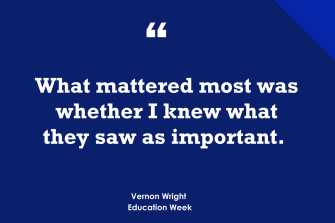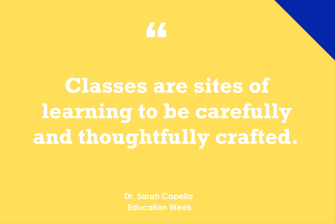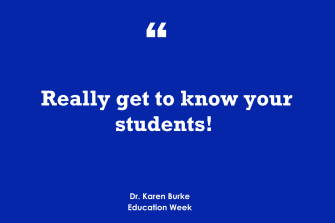(This is the third post in a four-part series. You can see Part One here and Part Two here.)
The new question-of-the-week is:
In 300 words or less, what is the most important teaching advice that you have either received or given?
Part One‘s guests were Chelonda Seroyer, Jenny Vo, PJ Caposey, Emily Golightly, Cindy Garcia, Mary K. Tedrow, Dr. Sawsan Jaber, and Aubrey Yeh. Chelonda, Jenny, PJ, and Emily were also guests on my . You can also find a list of, and links to,
Part Two‘s contributors were Keisha Rembert, Leah B. Michaels, Luiza Mureseanu, Jenny Edwards, Ph.D., Dr. Kulvarn Atwal, Sarah Brown, and Gretchen Bernabei.
Today, Tara Bogozan, Ryan Huels, Laura Robb, Vernon Wright, Dr. Sarah Capello, and Dr. Karen Burke share their knowledge.
‘The Responsibility to Speak Up’
Tara Bogozan is an English teacher and AVID elective educator. She has taught both middle and high school in the Atlanta metro area for over 17 years. You can follow her @mrs_tbogo on Twitter:
It was the last day of postplanning, and I was in a hurry. I walked into the main office to turn in paperwork before leaving for the summer when I ran into a colleague who was retiring. We exchanged the usual pleasantries, and I mentioned that I was entering the summer that would mark the middle of my career: 14 years, three schools, five different grade levels. In spite of the usual challenges, I still enjoyed teaching. I offhandedly asked him if he had any advice for me for the second half of my career. To poorly paraphrase, this is the advice he gave me:
Speak up. When a teacher has taught 15, 20, 25 years or more, they not only have the right but the responsibility to speak up.
Speak up to address systems that harm students. Speak honest praise and with purposeful positivity. Support new teachers who are struggling by being the one experienced teacher who does not join in the complaining but who constantly seeks self-improvement. Take the time to reflect before reacting to change. Above all, experienced teachers should use the weight that knowledge and success in the classroom have afforded them for the greater good of the school, the community, and the profession.
I gave my paperwork to the secretary and left the office. I have no idea if my colleague would even remember our brief exchange, but I will never forget it. Even if we are nervous, even if we feel outnumbered, we should speak up when necessary. Now, more than ever, experienced teachers need to understand the power they have to enact great change amidst our greatest challenges.

Taking Risks
Ryan Huels is currently an assistant principal at Oregon Elementary School in Oregon, Ill., after an extended tenure as an early-elementary classroom teacher. Ryan is an advocate for creating a more student-focused learning environment centered around the principles of positive relationships, restorative practices, and family engagement:
The most important thing I convey to any new teacher in our building echoes the great educator Todd Whitaker: “We didn’t hire you to fall in line or be a clone of the person you are replacing, we are bringing you on board to make us better!”
In my initial meetings with a new staff member, I try to convey the importance of them staying true to themselves and being willing to take risks in the name of doing what is best for kids. By giving them permission to be themselves and focus on what truly matters—creating unique experiences for kids by way of developing outstanding relationships that push kids to new heights—new staff will be more inclined to take risks and worry less about the pressures of fitting in with the status quo or keeping up with the teacher down the hall.

‘Form Trusting Relationships’
Author, teacher, coach, and speaker Laura Robb has worked with children and teachers for more than 40 years. At present, she works at Daniel Morgan Intermediate School in Winchester, Va., training 5th and 6th grade teachers and teaching children who read four to five years below grade level. Author of more than 30 books on literacy, Robb co-authors with her son, Evan:
My first year of teaching was 1963. My husband and I had moved to Winchester, Va., from New York City, where I was a copywriter for an advertising agency. No ad agencies in Winchester. Determined to work, I obtained a 6th grade teaching position in a country school, north of Winchester. In college I majored in English and French literature; I knew nothing about teaching, but I loved reading and read aloud to students every morning and after lunch.
That year, my students taught me. I watched, listened, and conferred with them one-on-one and in small groups to discover their interests and dreams. They lobbied to read more than the stories in their basal reader and the one book they could check out twice a month from the school library. Students’ desire to read real books led my husband and me to the public library. We each checked out 10 books a month, returning them on the due date, and renewing popular books that had a wait list.
During that first year my students taught me that reading books and listening to daily read alouds was important. They taught me that talking about books to classmates and to me during conferences was enjoyable. They advertised books they “couldn’t put down” by writing titles and mini-reviews on the chalkboard.
The best teaching advice I could give to others is to get to know your students. Form trusting relationships. Listen to their questions and requests. Learn from their words, interactions, and writing. What I learned that first year is what skilled teachers do today: read aloud every day; reserve time for students to self-select books for daily independent reading; confer with students; and encourage meaningful conversations about books!

‘The Connection Should Always Be First’
Vernon Wright (@TheWrightLeader) is an entrepreneur, speaker, leader, and the founder of ZeroApologyZone.com. He has over 15 years of experience in urban school districts and has served in various roles including teacher, campus leadership, and central office:
I’ve been immensely blessed to have had the opportunity to work amongst and witness the brilliant work and contributions of students, staff, and leaders in a career approaching two decades. Within that body of work and in various positions, many pieces of guidance have been shared with me. I’m honored and humbled to share some of that with you here.
When I entered the profession years ago as a new teacher, I remember one of our senior teaching instructors/mentors sharing that as effective educators, we’d need to be aware of the things that mattered most to our students. From the music they listened to, to the shows they watched, and to the clothes they wore, collectively it was all a window into what students valued.
In essence, I realize now but didn’t back then, it was the beginning of understanding authentic expressions of student choice and student voice. When I took time to learn what was important to them, they were interested in knowing what was important to me.
Fast forward a few years to the time when as a newly-minted member of the campus leadership team, I found that same guidance to be effective but this time within the context of working with teachers. I found that what really mattered wasn’t my title. What mattered most was whether I knew what they saw as important. I’ve reflected on those days many times over the years and have shared those reflections with many audiences at various speaking engagements.
Our connection with people often determines the trajectory and altitude of our collective impact. Sometimes the tendency may be to focus on the impact, but the connection should always be first. Only then can we focus on the impact and then scale allowing us to reach people and change lives.

Stagecraft
Dr. Sarah Capello is a fellow of the Western PA Writing Project and has seven years’ experience teaching writing at various levels. She currently teaches in the master’s and doctoral programs at Judson University:
Dr. Paul Sorrentino, beloved professor emeritus at Virginia Tech (and a literal Most Interesting Man in the World), modeled some of the best teaching advice I’ve received. Dr. Sorrentino considered himself a performer and the classroom his stage. On the last day of class, Dr. Sorrentino dazzled us with sleight of hand tricks and astonishing mind-reading illusions. He also brought his magic into the daily classroom grind. For each class, he carefully considered the audience, set the stage, anticipated the plot structure of the learning, and created spaces for magic and wonder.
While I don’t embody the teacher-as-performer role as Dr. Sorrentino did (I can’t shuffle cards well, let alone perform card tricks), my takeaway was that classes are sites of learning to be carefully and thoughtfully crafted. I see myself as a stage director responsible for setting the stage for learning. I consider: the physical space (lighting, props, setting, backdrop, time); the script (who writes it, who speaks, the characters, what they say, the actors’ interpretations); the staging (physical movement); intermission; and guiding the actors through the action. There is space for dress rehearsals and dry runs; however, in the final performance, the actors take over and shine on stage.
My purpose in this approach is not to entertain an audience or to position students as performing for consumers but to provoke thought, revisit and critique history, honor culture, and create a collaborative space for all to participate.
While Dr. Sorrentino performed on stage, I am watching offstage, but the common task is to intentionally craft lessons using dramatic elements that spark student agency, excitement, creativity, and, yes, sometimes a little magic.

‘Build a Community of Learners’
Dr. Karen Burke, the senior vice president of data analysis and academic planning at Scholastic, has been in education for over 30 years and has served students in various capacities including: 10 years as a classroom teacher, principal, Title I director, federal programs coordinator, curriculum director, director of English/language arts, and an assistant superintendent of schools in Maine:
Get to know your students! Really get to know your students! As a new year begins, build an understanding of the strengths and needs they will bring to the classroom by checking in with last year’s teachers and reading their files. However, don’t let the information you gather cloud your vision of who these students are or can become—remember to afford each student the opportunity to start anew and time to build a special relationship with you.
Throughout the year, reach out to students and ask them questions such as: What do you like to do outside of school? What would make our classroom work for you? How do you feel when you are in our classroom? What do you and your friends enjoy doing? How is this year going for you? What would you want me to know about you? And be sure to LISTEN to their responses! Read between the lines and use what they share with you to make connections within the classroom.
Take time to build a community of learners rather than just teaching students. Let them know you care about them as individuals by giving your time to show you care. This can include writing a note, making a call/text home to share something special that happened, sharing lunch together, or spending time talking about an interest or concern.
Have high, realistic expectations for all children and ensure you understand enough about each student to provide the guidance needed for each to be successful.
It is important to remember the words of Leo Buscaglia: “Too often we underestimate the power of a touch, a smile, a kind word, a listening ear, an honest compliment, or the smallest act of caring, all of which have the potential to turn a life around.”

Thanks to Tara, Ryan, Laura, Vernon, Sarah, and Karen for their contributions!
Please feel free to leave a comment with your reactions to the topic or directly to anything that has been said in this post.
Consider contributing a question to be answered in a future post. You can send one to me at lferlazzo@epe.org. When you send it in, let me know if I can use your real name if it’s selected or if you’d prefer remaining anonymous and have a pseudonym in mind.
You can also contact me on Twitter at .
�����ܹ���̳ has published a collection of posts from this blog, along with new material, in an e-book form. It’s titled .
Just a reminder; you can subscribe and receive updates from this blog via (The RSS feed for this blog, and for all Ed Week articles, has been changed by the new redesign—new ones won’t be available until February). And if you missed any of the highlights from the first nine years of this blog, you can see a categorized list below.
I am also creating a .





